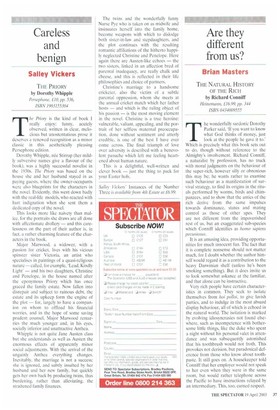Careless and benign
Salley Vickers
THE PRIORY by Dorothy Whipple Persephone, £10, pp. 536, ISBN 1903155304 The Priory is the kind of book I really enjoy: funny, acutely observed, written in clear, melodious but unostentatious prose it deserves a renewed recognition as a minor classic in this aesthetically pleasing Persephone edition.
Dorothy Whipple, nee Stirrup (her mildly subversive names give a flavour of the book), was a highly successful novelist in the 1930s. The Pribiy was based on the house she and her husband stayed in as paying guests, where the owner-occupants were also blueprints for the characters in the novel. Evidently, this went down badly with the real-life models, who reacted with hurt indignation when she sent them a dedicated copy of the novel.
This looks more like naivety than malice, for the portraits she draws are all done with affectionate drollery — and this carelessness on the part of their author is, in fact, a rather charming feature of the characters in the book.
Major Marwood, a widower, with a passion for cricket, lives with his vicious spinster sister Victoria, an artist who specialises in paintings of a quasi-religious nature — called, for example, 'Lead, Kindly Light' — and his two daughters, Christine and Penelope, in the house named after the eponymous Priory which has once graced the family estate. Now fallen into disrepair and subject to ruinous debt, the estate and its upkeep form the engine of the plot — for, largely to have a companion on whom to offload his financial worries, and in the hope of some saving prudent counsel, Major Maiwood remarries the much younger and, in his eyes, socially inferior and unattractive Anthea.
Whipple is not quite Jane Austen class but she understands as well as Austen the enormous effects of apparently minor social adjustments. With the arrival of the ungainly Anthea everything changes. Inevitably, the marriage is not a success: she is ignored, and subtly insulted by her husband and her new family, but quickly gets her own back by producing twins, thus burdening, rather than alleviating, the straitened family finances. The twins and the wonderfully funny Nurse Pye who is taken on as midwife and insinuates herself into the family home, become weapons with which to dislodge both sister-in-law and stepdaughters, and the plot continues with the resulting romantic affiliations of the hitherto happily neglected Christine and Penelope. Here again there are Austen-like echoes — the two sisters, linked in an affection bred of parental inadequacy, are really chalk and cheese, and this is reflected in their life philosophies and choice of partners.
Christine's marriage to a handsome cricketer, also the victim of a subtle parental oppression, whom she meets at the annual cricket match which her father hosts — and which is the ruling object of his passion — is the most moving element in the novel. Christine is a true heroine: vulnerable, valiant, appealing, and the portrait of her selfless maternal preoccupation, done without sentiment and utterly credible, is one of the best I have ever come across. The final triumph of love over adversity is described with a benevolent panache which left me feeling heartened about human nature.
This is a delightful, well-written and clever book — just the thing to pack for your Easter hols.


































































 Previous page
Previous page